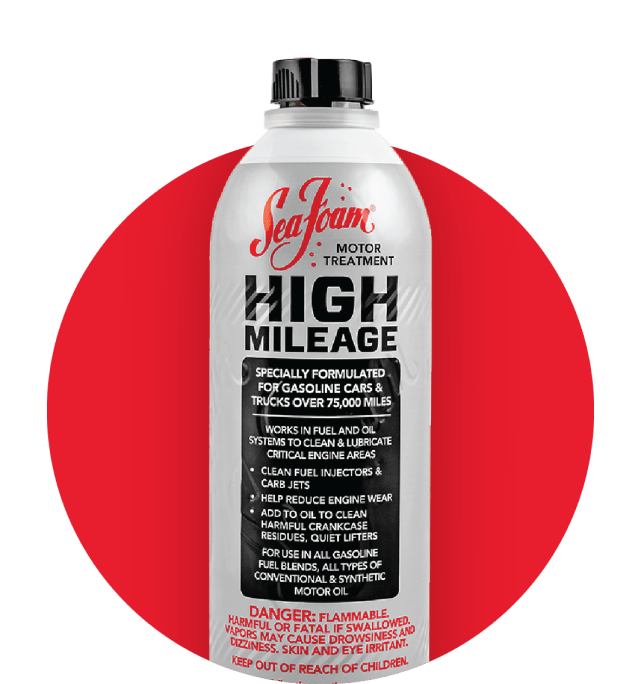HOW TO USE SEA FOAM HIGH MILEAGE
BENEFITS
DIRECTIONS in fuel
DIRECTIONS in oil
treatment recommendations
SUMMARY
Sea Foam High Mileage is specially formulated for gas cars and trucks over 75,000 miles. Use High Mileage to help minimize long-term wear and prevent rough engine performance in higher mileage vehicles.
Sea Foam High Mileage is a blend of cleaning and lubricating petroleum ingredients that can be used SAFELY in all types of 2- & 4-stroke gas engines and all types of gasoline fuel and ethanol blends. High Mileage is ideally formulated to clean dirty fuel injectors and carb jets, intake valves, and chamber areas after years of harmful buildup. It helps resist the common problems that higher mileage vehicles face, like engine wear, oil burning, and rough performance.
Simply pour High Mileage in your fuel tank and oil crankcase to clean and lubricate critical engine areas and help keep your higher mileage vehicle on the road longer

HOW TO USE SEA FOAM
high mileage
RELATED QUESTIONS
I have a 2016 Kia Sorento with heavy carbon build up. My plan is to use Sea Foam high mileage for at least 300 miles in the crankcase and a couple tanks of good gasoline with Sea Foam in it, as well. Should I run into 4 or 500 miles before I change the oil, keeping in mind I’m adding new oil and new Sea Foam, do you believe this is safe? When I say ‘should I’, it means ‘in case I do’.
Hi Harold,
Thanks for the question! You’re on the right track.
It’s okay to leave High Mileage in the oil as long as you’d like. We typically recommend adding it 100-300 miles before your next oil change. That gives the Sea Foam enough time to circulate and clean, and it allows all the reliquefied oil residues to be drained away with the old oil. 300-500 miles is just fine. While you can add it to the fresh oil as well, I’d recommend waiting until you’re 300 miles out from your next oil change for the reasons above. [Note: never exceed one treatment per oil interval; add 1 ounce of High Mileage per quart of oil in the crankcase and don’t exceed that ratio].
As far as the fuel tank, here’s what I’d do to get the most cleaning out of it. I like to wait until the tank is low (1/4 -1/8 tank), add the whole 16 oz can, and then drive for at least 10-20 miles before refueling. It’s safe to add a high concentration like that and it works very well for cleaning fuel residues and deposits. One tank of gas with a high concentration like this will do a good job cleaning, but you can do it for a second tank if you’d like.
Can I use too much Sea Foam in my 2012 High mileage Honda Odyssey? Like every other tank?
Thanks for the question, Debbie.
You can’t really use “too much” Sea Foam in the fuel tank of your 2012 high-mileage Honda Odyssey — Sea Foam is made from petroleum ingredients that are safe for your Odyssey and will not harm your engine when used as directed.
That said, for a vehicle that’s driven weekly, Sea Foam doesn’t need to be added to every single tank, unless you want to use it that way. For regular fuel system maintenance, we recommend adding the treatment to your fuel about every 3,000 miles.
If your vehicle isn’t driven often or if fuel sits in the tank for longer periods, adding Sea Foam at every fill-up is also fine and will help keep fuel fresh and prevent gum and varnish from forming — there’s no downside to having Sea Foam in the tank more often.
Hope that helps and let me know if there’s anything else!
2015 Dodge charger v6 will it hurt it and how much is too much 110.00miles runs great
Hey Percy,
It won’t hurt anything. As far as how much to put in the gas tank for high cleaning concentration, I like to wait until the tank is low (1/4 -1/8 tank), add the whole 16 oz can, and then drive for at least 10-20 miles before refueling. It’s safe to add a high concentration like that and it works very well for cleaning fuel residues and deposits. One can in 2-3 gallons works great and is sufficient. The most you should add is a 1:2 ratio of Sea Foam to gas. But a can in 2-3 gallons is just fine. Hope that helps!
Can I add Sea Foam to my oil crankcase on my BMW 2013 316i N13?
Thanks for the question. Yes, you can absolutely use Sea Foam Motor Treatment in the oil crankcase of your BMW 2013 316i N13.
Here’s a little more info on how to use it:
- Add 1 ounce of Sea Foam per quart of oil in the crankcase. We recommend adding it 100-300 miles before your next oil change. That gives the Sea Foam enough time to circulate and clean, and it allows all the reliquefied oil residues to be drained away with the old oil. To help progressively clean up your oil crankcase, add it before every oil change.
You could also try High Mileage Motor Treatment. It’s made specifically for stubborn residues and deposits in higher-mileage vehicles. It’s a great cleaner!
How much and when should I add Sea Foam to my oil and my fuel for my Scion XB 2012?
Thanks for the question, Corrie. Here’s how much and when to add Sea Foam in your 2012 Scion XB:
- Sea Foam Motor Treatment in fuel. I like to wait until the tank is low (1/4 -1/8 tank), add the whole 16 oz can, and then drive for at least 10-20 miles before refueling. It’s safe to add a high concentration like that and it works very well for cleaning fuel residues and deposits. Add it to fuel like this every 3,000 miles or once a year.
- Sea Foam Motor Treatment in oil. Add 1 ounce of Sea Foam per quart of oil in the crankcase. We recommend adding it 100-300 miles before your next oil change. That gives the Sea Foam enough time to circulate and clean, and it allows all the reliquefied oil residues to be drained away with the old oil. To help progressively clean up your oil crankcase, add it before every oil change.
You could also try High Mileage Motor Treatment. It’s made specifically for stubborn residues and deposits in higher-mileage vehicles. It’s a great cleaner!
Can I add Sea Foam to my oil if my 2010 Dodge Ram is burning motor oil?

Jim D.TECH
0